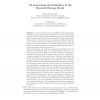Free Online Productivity Tools
i2Speak
i2Symbol
i2OCR
iTex2Img
iWeb2Print
iWeb2Shot
i2Type
iPdf2Split
iPdf2Merge
i2Bopomofo
i2Arabic
i2Style
i2Image
i2PDF
iLatex2Rtf
Sci2ools
137
click to vote
EUROCRYPT
2004
Springer
2004
Springer
On Generating the Initial Key in the Bounded-Storage Model
Abstract. In the bounded-storage model (BSM) for information-theoretically secure encryption and key-agreement one uses a random string R whose length t is greater than the assumed bound s on the adversary Eve’s storage capacity. The legitimate parties Alice and Bob share a short initial secret key K which they use to select and combine certain bits of R to obtain a derived key X which is much longer than K. Eve can be proved to obtain essentially no information about X even if she has infinite computing power and even if she learns K after having performed the storage operation and lost access to R. This paper addresses the problem of generating the initial key K and makes two contributions. First, we prove that without such a key, secret key agreement in the BSM is impossible unless Alice and Bob have themselves very high storage capacity, thus proving the optimality of a scheme proposed by Cachin and Maurer. Second, we investigate the hybrid model where K is generated by a comput...
Related Content
| Added | 01 Jul 2010 |
| Updated | 01 Jul 2010 |
| Type | Conference |
| Year | 2004 |
| Where | EUROCRYPT |
| Authors | Stefan Dziembowski, Ueli M. Maurer |
Comments (0)

